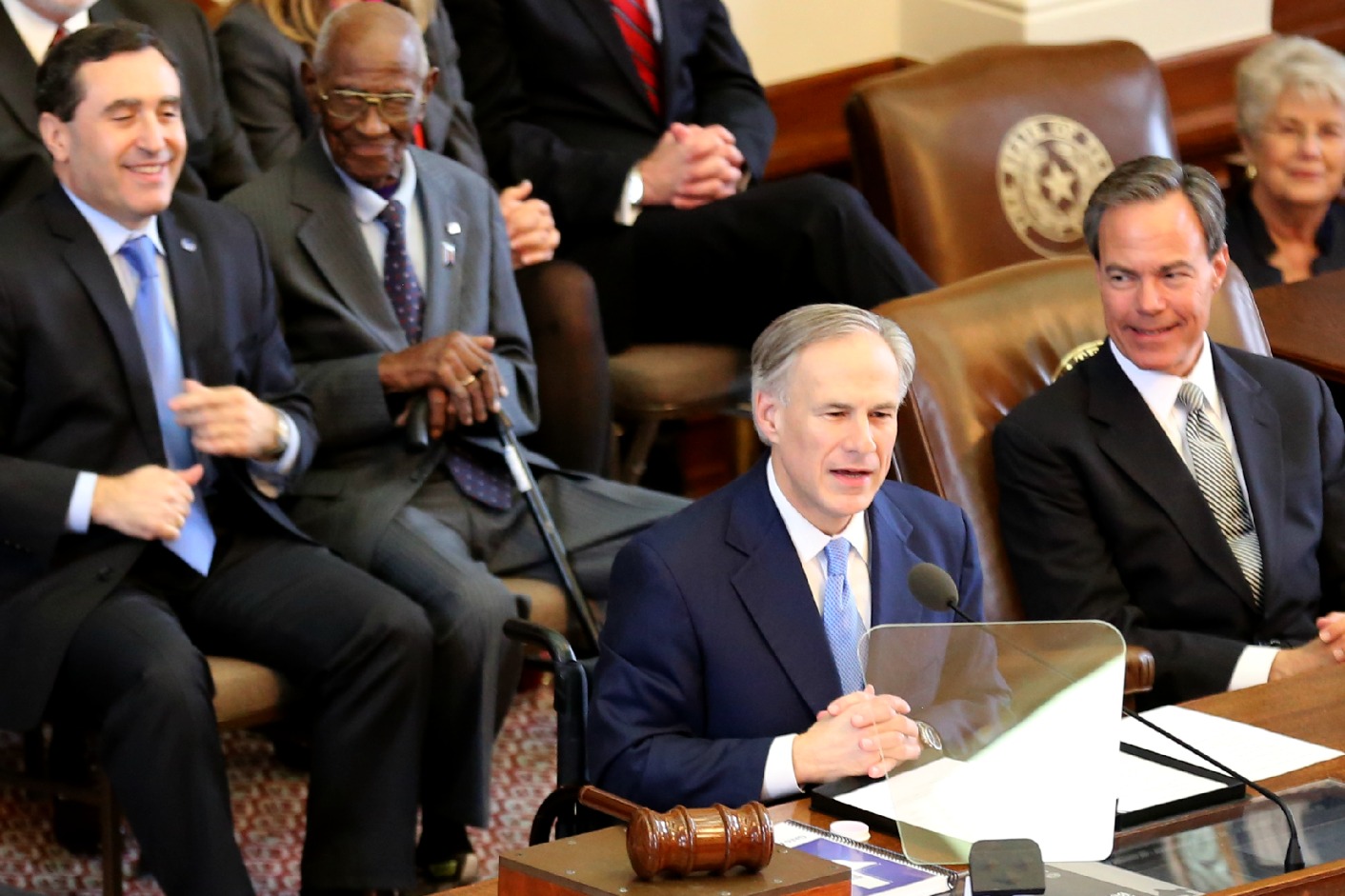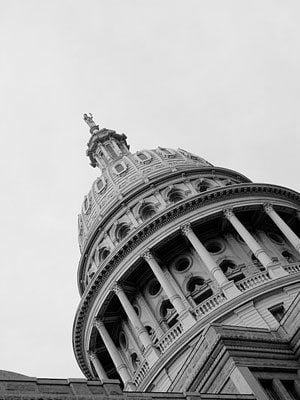
The Winners and Losers of the Battle for Campus Carry

Above: Under the compromise legislation, presidents of public universities like the University of Texas at Austin will be able to write "reasonable rules" about where concealed handguns may be carried.
As in a Chekhov story, a gun introduced in the first chapter of the 84th Texas Legislature was bound to be fired later in the session. The session began with guns, and so it ended. On Sunday, the last day to pass legislation, the Legislature finally approved a “campus carry” bill, allowing concealed handgun license holders to carry handguns on college campuses.
From the beginning of the session, the fate of campus carry was uncertain. Gov. Greg Abbott and House Speaker Joe Straus never showed much enthusiasm for the idea, and most university administrators and faculty despised the idea of guns on campus. As late as mid-May, Senate Bill 11 was stuck in a House committee, where many observers expected it to perish. Still, campus carry has been a fetish of some gun rights activists for years and Lt. Gov. Dan Patrick had pledged during his campaign to pass a bill allowing guns on campus. Late in the session, lawmakers managed to cobble together a version that ultimately pleases very few.
That version, now on the governor’s desk, contains a major concession to opponents of campus carry. Public universities can’t opt-out of the law, but university presidents will be allowed to write “reasonable rules” about where concealed handguns may be carried. Those rules can be changed by a two-thirds vote of the university system’s board of regents.
The bill’s author, Sen. Brian Birdwell (R-Granbury), said that even with that change, the intent of the bill is for “public colleges to be as permissive and accessible to CHL holders as possible” and for universities to be as “minimalistic as possible” when establishing restrictions. The bill’s language states that university leaders may not establish rules that “generally prohibit” or “have the effect of generally prohibiting” campus carry.
But the bill’s text doesn’t provide a definition of “reasonable rules.” Rep. Trey Martinez Fischer (D-San Antonio) said he “completely disagreed” with Birdwell’s interpretation of the bill. He said that “reasonable rules” provision was offered by the House to give universities broad discretion in implementing the policy.
Martinez Fischer and several other House Democrats, opposing campus carry in any form, voted against the bill.
With the messy and uncertain ending to the campus carry fight, it’s worth asking: Who won?
Lt. Gov. Dan Patrick:
Lt. Gov. Dan Patrick has long been a supporter of campus carry. In 2013 he co-authored a bill to allow concealed handgun license holders to carry handguns into buildings on college campuses. (CHL holders are currently allowed to carry concealed handguns on college campuses outdoors.) That bill was referred to committee but never got a hearing. In a campaign ad for the lieutenant governor’s race in 2013, he promised to pass campus carry this session, and said in a Jan. 28 Facebook post: “regarding the Second Amendment, our first priority this session is to pass Campus Carry.”
But Patrick shifted his focus after he ran afoul of open carry activists. In a January interview with Texas Tribune editor Evan Smith, Patrick said he didn’t think there were enough votes to pass open carry. The activists were livid. Patrick quickly backpedaled, calling for a committee hearing on open carry legislation as soon as possible. He even had his staff meet with open carry activists just a week after several members of Open Carry Tarrant County threatened Rep. Alfonso “Poncho” Nevarez (D-Eagle Pass) in his office.
In March, after the Senate voted to send SB 11, the campus carry bill, to the House, Patrick released a statement that applauded Sen. Birdwell’s leadership and said the bill “expands and protects Second Amendment Right legislation in a historic way.”
Patrick has been mum on the bill since, so it’s unclear how he feels about the version that was sent the governor.
Although the current legislation is a watered-down version of the bill Patrick co-authored last session, its passage is a win for the lieutenant governor, who will no doubt retain his “A” rating from the NRA and get to claim that he passed a bill important to some gun activists.
Verdict: A win for Patrick.
Gov. Greg Abbott:
The version of campus carry that was finally passed last weekend closely aligns with Gov. Greg Abbott’s original stance on the issue. Abbott’s policy plan, released in 2013, recommends that CHL holders be allowed to carry weapons on college campuses “subject to appropriate limits.” It goes on to state that public institutions should be allowed to “opt out of campus carry requirements” and that private institutions should not be required to opt in.
But at a press conference in February, Abbott said he would sign “whatever legislation reaches my desk that expands Second Amendment rights in Texas,” including campus carry legislation, with or without an opt-out provision.
Throughout the session, Abbott has been a vocal supporter of legislation allowing CHL holders to openly carry handguns. In his State of the State address, he gave a shout-out to open carry, and almost immediately after both chambers gave their final approval to the bill, Abbott tweeted: “Open Carry just passed in both the Texas House & Senate. Next destination: My Pen.” Campus carry didn’t get the same tweet of approval, but Abbott indicated in a radio interview Tuesday morning that he’d sign the bill.
Verdict: A win for Abbott.
Gun Rights Groups:
Overall, gun rights groups this session have been focused more on open carry than on campus carry. The usual suspects—the NRA and the Texas State Rifle Association—testified in support of campus carry during public hearings on SB 11 and House companion HB 937. Open Carry Texas, one of the more extreme Second Amendments groups, got in on the game, too, although that group has prioritized constitutional carry—the right to openly carry a handgun without a license.
Open Carry Texas leader C.J. Grisham released a statement on the group’s Facebook page saying he appreciates that he will now be able to defend himself and others “in the unlikely event that there is an active shooter.”

He called the legislation “common sense” and said that it abolishes a “major gun-free, victim-spree zone.”
Students for Concealed Carry—a national lobbying group with chapters at a few Texas universities—wasn’t so quick to declare the bill’s passage a victory. In a statement published on Twitter by Houston Chronicle reporter Lauren McGaughy, the group declared “we’ve lost” and said it would “appreciate it if the bill’s authors and sponsors would quit confusing the issue by claiming a victory for our side.”
The group is unhappy with the bill’s provision giving university leaders discretion to prohibit guns in certain buildings, and has vowed to lobby during the next session to remove that provision.
Verdict: A partial victory.
Campus Carry Opponents:
Gun violence prevention groups like Moms Demand Action and Texans for Gun Sense banded together with student groups to try to stop campus carry legislation from passing this session. William McRaven, chancellor of the University of Texas System—and a retired U.S. Navy admiral—supported their cause, writing letters to the Legislature to discourage passage of the bills. In one he wrote, “the presence of concealed weapons will make campus a less safe environment.”
During House debate on the conference committee report on Sunday, Rep. Helen Giddings (D-DeSoto) said she’d received more letters and phone calls from people about campus carry legislation than about any other bill during her decade in the Legislature.
Lawmakers, mostly Democrats, attempted to add more than 100 amendments to the bill and challenged it with points of order.
Sunday night, Julie Gavran, with the Campaign to Keep Guns Off Campus, was exhilarated as she watched the House video stream in Rep. Chris Turner’s (D-Grand Prairie) office. It appeared that the bill might fail to meet the session’s midnight deadline and die in the House. She said that the moment was “uplifting in a very depressing session.” But she was also skeptical, and with good reason. Shortly before the deadline, Democrats made a deal to pass the bill with altered language, sending it to conference committee.
The Campaign to Keep Guns Off Campus doesn’t view the watered-down bill as a win, because the rules can be changed with a two-thirds vote by each university system’s appointed board of regents.
Moms Demand Action, one of the most vocal gun control groups, said that the “compromise respects the wishes of the vast majority of university stakeholders” and called it a “drastic improvement” to the original language of the bill. McRaven said in a statement that he appreciated legislators “for recognizing the very specific safety considerations that are unique to campus environments.”
Verdict: A loss. But it could have been worse.
Everyone Else:
Arguably, the biggest losers in the campus carry battle are ordinary Texans. Not because college students are going to be met with an “entourage of guns,” as Rep. Alma Allen (D-Houston) said during the debate on Sunday. Only 3 percent of Texans possess concealed handgun licenses, and few of those are likely to be students, since a person must be 21 years of age or older to qualify.
Texans lost because the campus carry debate took up an inordinate amount of energy and time—precious resources for a Legislature that meets for only 140 days every two years. That’s time and energy that could have been used to deal with pressing problems—rising tuition comes to mind—instead of catering to a loud but small subset of gun owners.
The campus carry bill that passed is classic legislative sausage: an amalgam of different ideas compounded into a mess of a policy that no one is thrilled about. The bill is apparently intended to appease a vocal minority while trying to mollify the concerns of students, faculty and administrators, who didn’t ask for more guns on campus. It seems to have done neither.
In a speech on the House floor on Sunday, Rep. Sylvester Turner (D-Houston) lamented that campus carry would be a “banner headline” from this session. He said he wants Texas to be known as a state that makes sure kids are adequately educated and gives universities the resources they need to become the best in the world.
“I’d rather that Texas be known for that than for this bill that does nothing to further the education of our college students,” Turner said. “This bill does not serve the best interests of the students of the state of Texas.”


